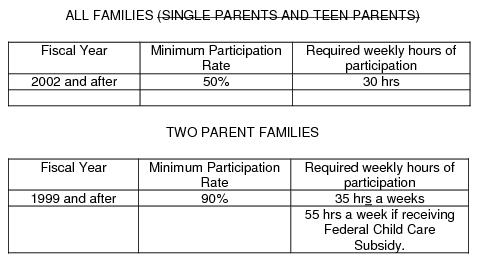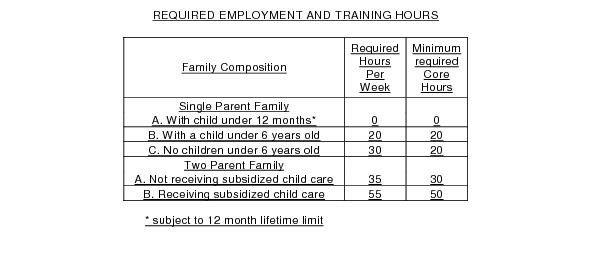DEPARTMENT OF HEALTH AND SOCIAL SERVICES
Division of Social Services
FINAL
ORDER
Temporary Assistance for Needy Families Employment and Training Program
Nature of the Proceedings:
Delaware Health and Social Services (“Department”) / Division of Social Services initiated proceedings to provide information of public interest with respect to the Temporary Assistance for Needy Families (TANF) Employment and Training Program regarding participation and participation rates. The Department’s proceedings were initiated pursuant to 29 Delaware Code Section 10114 and its authority as prescribed by 31 Delaware Code Section 512.
The Department published its notice of public comment pursuant to 29 Delaware Code Section 10115 in the January 2008 Delaware Register of Regulations, requiring written materials and suggestions from the public concerning the proposed regulations to be produced by January 31, 2008 at which time the Department would receive information, factual evidence and public comment to the said proposed changes to the regulations.
Summary of Proposal
The purpose of this regulatory action is to amend the Division of Social Services Manual (DSSM) regarding participation and participation rates provisions for the TANF Employment and Training Program.
Statutory Authority
Summary of Proposed Change
DSSM 3006.2, TANF Employment and Training Participation and Participation Rates: These rule modifications clarify the calculation of the work participation rate and the required participation of TANF recipients in employment and training activities. Previously implemented in January 2007, this policy was already a federal exemption option but DSS was more restrictive with the thirteen (13) weeks option.
Summary of Comments Received with Agency Response
The Governor’s Advisory Council for Exceptional Citizens (GACEC) and the State Council for Persons with Disabilities (SCPD) offered the following observations and recommendations summarized below. DSS has considered each comment and responds as follows.
First, Council suggests DSS consider substituting “Two Employable Parent Families” for “Two Parent Families” in the heading of the second table on p. 870. This would conform to 45 C.F.R. 261.24(a)(2) which recites as follows:
The rate applies to the two-parent families with two work-eligible individuals. However, if one of the parents is a disabled work-eligible, we will not consider the family to be a two-parent family, i.e., we will not include such a family in either the numerator or denominator of the two-parent rate.
Agency Response: Federal and State regulations consistently reference “Two Parent Families”; while your suggestion does offer clarification to parts of the definition of a two parent family it could also result in increased confusion as to what is meant by “employable”. DSS has decided to leave the header unchanged.
Second, since the current federal regulatory changes took effect in 2006, DSS could consider substituting “2006 and after” for “2002 and after” and “1999 and after” in the tables on p. 870.
Agency Response: The chart referenced accurately reflects the federally required state participation rates for the years 1999 and 2002. The federal policy reflected in the chart predates rule changes that resulted from the passage of Deficit Reduction Act of 2005.
Findings of Fact:
The Department finds that the proposed changes as set forth in the January 2008 Register of Regulations should be adopted.
THEREFORE, IT IS ORDERED, that the proposed regulation to amend the Temporary Assistance for Needy Families (TANF) Employment and Training Program regarding participation and participation rates is adopted and shall be final effective March 10, 2008.
Vincent P. Meconi, Secretary, DHSS, February 13, 2008
DSS PROPOSED REGULATION #08-08
REVISIONS:
3006.2 TANF Employment and Training Participation and Participation Rates
Under the Temporary Assistance For Needy Families Block Grant, DSS is required to meet the following work participation rates with respect to all families that include an adult or minor child head of household receiving assistance:

DSS may face a lower work participation rate if it experiences a net caseload reduction compared to FY 2005.
Example: If it is determined that DSS' average monthly caseload in FY 2006 was 4 percentage points lower than average monthly caseloads in FY 2005, then, rather than having to meet a 50% work participation rate requirement in FY 2006, the rate would be lowered by 4 percentage points to 46%.
To be counted toward meeting the work participation rate, each individual must meet the required number of hours each week.
Single parents who are not working 30 hours a week or making an equivalent of 30 hours a week times minimum wage are required to participate in work and/or work related activities. Participation in work and work related activities must equal at least a minimum average of 30 hours a week.; and, at least 20 of the hours per week must come from participation in federally defined core activities.
Single parent/caretaker TANF recipients with a child in the TANF household under six are deemed to be engaged in work for a month if the recipient is engaged in federally defined core work activities for an average of at least 20 hours per week during the month.
Two-parent families where one parent is not working at least 35 hours a week or making the equivalent of 35 hours a week times minimum wage are required to participate in work and/or work related activities. Participation in work and work related activities must equal an average of at least 35 hours a week.; and, at least 30 of the hours per week must come from participation in federally defined core activities.
Two parent families who receive federally funded Purchase of Care services who are not working at least 55 hours a week or making the equivalent of 55 hours a week times minimum wage are required to participate in work and/or work related activities. Participation in work and work related activities for one parent must equal 35 hours a week. Combined hours of participation in work and work related activities must equal an average of at least 55 hours a week. Of the average 55 hours a week the participants must average at least 50 hours a week of federally defined core activities.
Teen parents are required to attend school, work, or participate in the employment and training activities. Elementary, sSecondary, post-secondary, vocational, training school, and participation in a GED program meets participation requirements for the month and is the equivalent to work. If they are not attending one of the above types of school or working for 30 hours a week they must participate in employment and training activities for 20 or 30 hours a week.
Single custodial parents with a child under 12 months of age are able to receive an exemption from Employment and Training requirements for a total of 12 months in their lifetime. These 12 months can be used any time the parent has a child less than 12 months of age. Once the youngest child reaches 12 months of age the parents are required to participate in Employment and Training. If they are already working the equivalent of their required Employment and Training Hours (20, 30, 35, 55), the DCIS II system will code them as volunteers for Employment and Training.
The monthly participation rate is calculated as follows:

Numerator: # of TANF and SSP-MOE families with a work-eligible-individual who meet the participation requirement for the month
divided by
Denominator: # of TANF and SSP-MOE families that include a work-eligible individual, less # of families sanctioned in that month for failure to participate in work (for up to 3 months in preceding 12 month period), less the number of non-needy caretaker households less the number of single custodial parents opting to use one of the 12 months allowable exemptions for caring for a child under one year of age. A parent can only use this exemption for a total of 12 months in their lifetime.
8 DE Reg. 1618 (5/01/05)
10 DE Reg. 706 (10/01/06)







